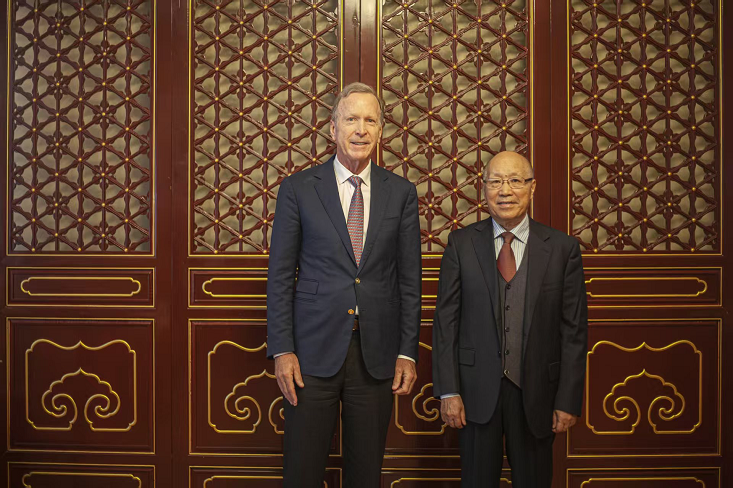ICC Holds Talks with Chairman of the George H.W. Bush Foundation for U.S.-China Relations Neil Bush
Invited by the International Cooperation Center (ICC), Neil Bush, Chairman of the George H.W. Bush Foundation for U.S.-China Relations, visited the Jianguomen office of the ICC on 30 October 2025. Ma Shengrong, Chief Expert of the ICC and former Deputy President and Executive Editor-in-Chief of Xinhua News Agency, along with Zhang Yu, Convener of the Joint Meeting and Director of the Steering Committee of the ICC, met with Neil Bush and his delegation. Wang Tianyi, Academician of the International Academy of Astronautics and Executive Chairman of the International Peace Alliance (Space), was also present at the meeting. Both sides acknowledged that, as is widely recognized, the world today is undergoing a period of major development, transformation, and adjustment. A generally stable U.S.-China relationship is essential for the world. How the two countries interact not only concerns the vital interests of their peoples but also the future of humanity. During the talks, the two sides engaged in in-depth discussions on issues of mutual interest, including enhancing friendship between the Chinese and American peoples, deepening high-level 1.5-track dialogue, and strengthening coordination and cooperation in multilateral platforms such as the United Nations. Finally, important consensus was reached by both parties.

Ma Shengrong (Right) Neil Bush (Left)
The two sides noted that more than half a century ago, leaders of China and the United States melted the ice with a handshake across the Pacific. The current international landscape is fraught with turbulence and change, and the world stands at a new crossroads. The path it takes will profoundly shape the future. China and the U.S. account for one-quarter of the world’s population and one-third of its economic output. Mutual respect, peaceful coexistence, and win-win cooperation are key lessons in the development of China-U.S. relations. Today, the two heads of state met in Busan, engaging in in-depth discussions on strategic, long-term issues concerning bilateral relations and other major issues of mutual concern; it sends a positive signal to the world. A stable, healthy, and sustainable China-U.S. relationship serves the long-term interests of both nations. It also meets the common expectations of the international community, and contributes to global peace and development. It also injects stability, certainty, and constructiveness into a world beset by turbulence. Both of the sides expressed the hope that the ICC and the George H.W. Bush Foundation for U.S.-China Relations will work together to play a significant role in continuously promoting world peace, development, and the cause of China-U.S. friendship.
The two sides emphasized that "the bond between nations lies in the affinity of their peoples," and the foundation of state-to-state relations rests with the people of both countries. Looking back at the history of China-U.S. relations, people-to-people exchanges have always played a crucial role. As the third son of former U.S. President George H.W. Bush (Senior Bush) and the brother of President George W. Bush (Junior Bush), Neil Bush has long been committed to fostering high-level engagement, people-to-people friendship, and economic and trade cooperation between the U.S. and China. He noted that his father had built a deep friendship with China, which profoundly influenced his family. His father always believed that U.S.-China relations were among the most important bilateral relationships in the world, and that the two countries needed to work side by side in the face of global challenges. He fondly recalled his first visit to China in 1975, after which he had made over 150 trips to the country, visiting more than 60 cities and witnessing its rise firsthand. The two sides expressed their commitment to leveraging their respective strengths in Track 1.5 dialogues and people-to-people exchanges to make new contributions to the friendly development of China-U.S. relations.

The two sides held talks to discuss
Neil Bush currently serves as Honorary Chairman of the Board of the International Symposium on the Peaceful Use of Space Technology-Health (IPSPACE), an international conference that has been held in China for seven consecutive sessions. The discussions focused on leveraging multilateral mechanisms to play a pivotal role in maintaining international peace, as well as exploring pathways, mechanisms, and initiatives for organizing non-governmental international conferences under the support frameworks of the United Nations and other international organizations. Attending the meeting were: Zhu Hongshan, Economic Affairs Special Representative and Expert at the ICC, Cheng Yu, Executive Secretary-General of the ICC, Zhang Bin, Deputy Director of the Hong Kong, Macao, Taiwan, and Overseas Chinese Affairs Committee of the ICC, Wu Zhonglin, Executive Director of the Development Committee of the ICC, Xin Shaosong, Executive Deputy Director of the Secretariat Office; Wei Zheng, Secretary-General of the China Association of Remote Sensing Application and Joint Secretary-General of the International Peace Alliance (Space), Li Jian, Advisor to the International PeaceAlliance (Space) , Liang Weiwei, Joint Secretary-General of the International Peace Alliance (Space) , Wang Yubo, Joint Deputy Secretary-General, Lin Bing, and others.

